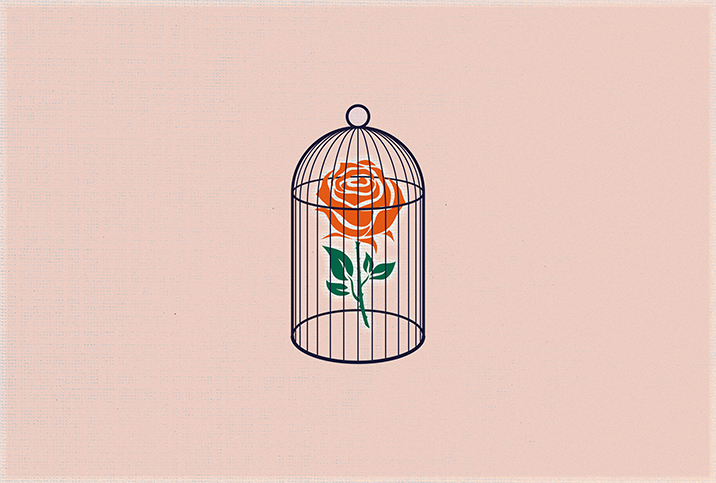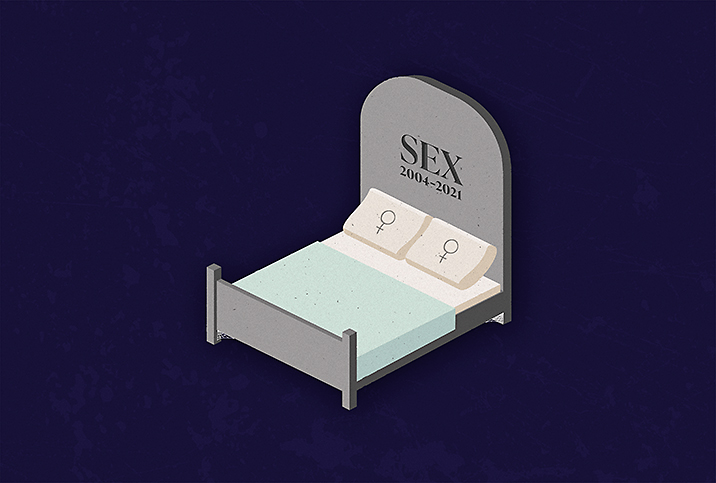What Is a Touch Me Not Lesbian? Where Tiktok Gets It Wrong

In 1993, author and activist Leslie Feinberg published hir historical queer novel, "Stone Butch Blues," bringing the titular demographic to the spotlight. You may have heard stone butches referred to as "touch-me-nots" or "stones."
They are people—most often, if not always, lesbians—who enjoy giving but not receiving in bed. (Editor's note: We'll use the words "touch-me-not" and "stone butch" interchangeably in this article.)
Almost 30 years later, TikTok creators have picked up on the term "stone butch" and taken it for a turn. TikTok is full of bad takes about touch-me-nots.
The hashtag #touchmenots has more than 98,000 views and counting, and the videos are, in one word, disgusting. Many people are claiming touch-me-nots "just haven't had good sex before," as if there's no possible way someone truly doesn't want to be touched sexually.
Get this: People in the queer community—mostly women—are the ones creating these videos.
What is being a stone butch is really like?
In a subreddit dedicated to butch lesbians (r/butchlesbians, appropriately), the topic of stone butches has inevitably arisen.
According to a comment by user u/dirtbag_dagger, touch-me-nots may not like sexual touch for a variety of reasons: not wanting genital stimulation to mess with their firm feelings about their gender identity and expression, trauma or simply not finding it enjoyable.
Lauren Stevenson, a 24-year-old nonbinary stone butch (yes, nonbinary lesbians exist) in the United Kingdom, has their own reasons, too.
"For me, being a stone butch is getting pleasure from someone else's enjoyment, and feeling safe and affirmed in my masculinity and body while I'm having sex," they said.
Not all stone butches are nonbinary, but Stevenson is one of many who are.
"I came out when I was 17 and I have been with my partner for almost seven years now. When I first met her, we had 'default' lesbian sex, and I wasn't happy for a couple of years, not realizing that this wasn't the standard experience," they said. "Rather than speaking to her, I gradually shut down and tried to avoid having sex altogether."
Thankfully, everything worked out OK—for the most part.
"In the end, she figured out herself what was going on and she was completely accepting of me being stone, but it was hard being so emotionally vulnerable," they said.
"I still find it really hard to talk about my dysphoria, and as stone butches, we often struggle to find the right words to talk about our bodies, even with a trusted partner," they noted.
Coming out is rarely easy, and it's something LGBTQ+ people have to do repeatedly for the rest of their lives. But the discomfort can be more bearable.
How do you tell your partner you're a stone butch?
Ultimately, your coming-out experience is yours, so do what you feel you need to do.
"A stone partner can use any medium that feels comfortable to them to [share] this information: in person or digitally, whatever works with them," said Erica Smith, M.Ed., a Philadelphia-based sex educator who's passionate about supporting the LGBTQIA+ community.
Not sure how to say it? Smith had a suggestion.
"I recommend saying something like, 'Hey, I want to tell you something that you may not understand at first. I am stone, which means that I enjoy touching my partners sexually but I do not want them to reciprocate and touch me. I can tell you specifics about what that means for me personally and what kind of touch is OK for me. Do you have any questions?'
"And be prepared for questions, because I think this is a very misunderstood identity," she added.
Speaking of being misunderstood...
"There are so many misconceptions about stone butches," Stevenson said. "Not all stone butches have exactly the same boundaries. Our partners are not less gay for only being receptive."
Smith has encountered misunderstandings of her own.
"Some people are quite judgmental when they hear that a partner doesn't want to be touched sexually. They assume there's something wrong with them, that they must have experienced trauma or that there's something that needs to be 'fixed' about them," she said. "In reality, not wanting to be touched sexually is a personal choice, not a deficit or a problem that needs to be fixed unless the stone person wants it to change."
Some people want a partner whom they can touch sexually. That doesn't mean either partner is in the wrong for having different desires.
Everyone gets to decide what touch means for themselves.
"If you don't want a stone partner because you enjoy pleasing a partner sexually with touch, that's fine. That just means a stone butch isn't for you, not that there's something wrong with them," Smith added. "Stone butches are hot and valid."


















